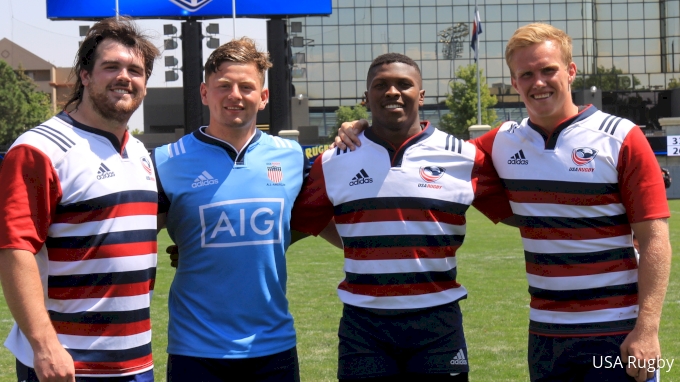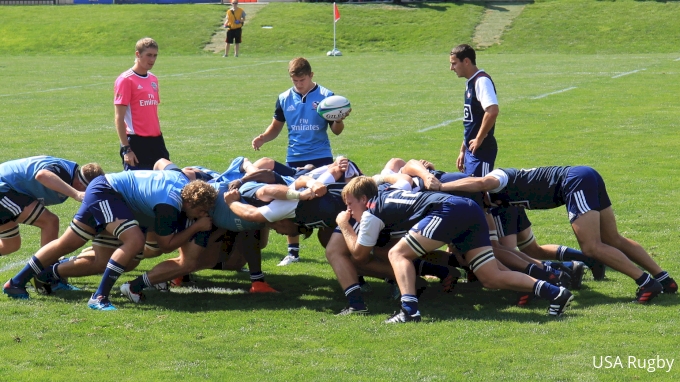7 Takeaways From The College All-American Summer
7 Takeaways From The College All-American Summer
A breakdown of the issues surrounding the All-Americans programs.

Unlock this article, live events, and more with a subscription!
Already a subscriber? Log In
The USA Rugby Collegiate All Americans program is weird, but perhaps is going to get a bit more normal.
In a way, that's the message from Men's Collegiate All-American head coach James Willocks in the video above, and it's the hope for college coaches around the country, too.
What the recent Men's All-American assembly showed us is that the program has legs and value. There are athletes who want to be a part of it, and don't just want the honor, but the coaching, the development, and the game opportunity.
FloRugby sat down with Willocks to ask how he felt his team's assembly went. It was a largely positive conversation, but it also raised some serious issues with regard to the All-American idea. Here are some takeaways from the summer, and from the interview:
1. The Game Is The Carrot
This year, the Men's All-American team was lucky. After the initial plan of starting a series with a Canadian U23 or Universities team fell through because Rugby Canada has its own problems, USA Rugby was left wondering what to do.
So instead of a camp and playing in June — coupled with the USA and Canada tests during that time — the program had to find other opportunities. Glendale, CO, stepped up, provided the All-Americans with a venue to train and play trial matches, and then provided the opposition, in the form of a hastily-assembled Glendale Raptors team.
It wasn't the strongest Raptors squad, but it was a good one, and the All Americans were impressive in winning 55-10.
Kudos to Glendale for doing this, but a last-minute stopgap isn't what the program should be.
(We should note that the Men's All-Americans will play in the RugbyTown 7s, and that's a good thing.)
2. Can You Depend On Your Neighbors?
We've seen this happen several times before. Someone sets up a game, and someone else can't show up. In the case of the summer of 2018, this was Rugby Canada unable to begin what is a pretty good idea. Hey, we've all been there. Rugby Canada will come to the table.

3. Development Matters; So Does Competition
The message from USA Rugby High Performance leadership is a legitimate one: You can spend resources on a tour, and affect 30 players, or you can spend resources on a camp, and affect three or four times as many.
What the Men's All-Americans did this year is a nice hybrid. Over 80 players came into camp, and over 50 left after three days, while the rest remained to get ready to play the Raptors. Willocks says he wants some more regional assemblies to widen the net and make the costs less onerous. But there needs to be a game at the end of it.
The Women's All-Americans didn't play anyone this year, and in fact, haven't since 2016. Future plans should include games, and the Rugby Canada partnership should address this.
4. Women's All Americans Matter
Back in the old days before we had a Women's Collegiate All-American program, we had the USA U23s. That team, scouted and assembled by accomplished coaches, played in the territorial championships, and went on tour all over the world. This was back when USA Rugby's budget was one-sixth of what it is today.
There's been a lot of talk about the All American Women, but a lot less action. This year, the program held a camp — a valuable camp — but when you look at the high-level competition opportunities, the late 1990s to early 2000s were far superior.
5. Leverage Knowledge — Return Of All-Stars?
This used to be a regular manta from this writer and others: Bring back the old territorial championships. I gave up harping on it because no one in USA Rugby's leadership wanted to pursue it. On the senior level, it doesn't matter anymore. A territorial tournament has been replaced by a different approach to assembling clubs and sevens teams. But on the college level, it is still possible to consider some sort of select-side competition. I would suggest it being a competition of all-conference teams, and one where we have challenge matches (one or two, say in January or June) rather than a championship.
But the idea — hinted at by Willocks in the interview — would be to at least use the knowledge base of coaches in a conference to find talent. Willocks just wants the list of all-conference teams, but what if that team took the field?
6. What Does It Mean To Be All-American?
Being an All-American is weird because it's both an honor and an accomplishment. Any other label you give on a national level — High School All-American, Junior All-American, Eagle — is earned by taking the field. Collegiate All-American started as an honors list, and only later because associated with playing a game.
And over time the label's meaning has changed. It could mean you played for the All-American team while on tour. It could mean you were invited to camp. It could mean you were put on a list.

This year, there was no list, just the camp. The camp was a self-fulfilling prophecy in that if you were invited and you showed up, you were an All-American. If you had other things going on at the time, you weren't.
That's not right. There should be a list right after the season ends — call them honorary All-Americans. Then there are players awarded All-American caps, who play in games. That's how it should be done.
7. The Future
A camp every June, at least a trial game and a game against Canadian counterparts every June, and a list every May. That's what should happen. Even better? get another Universities side to tour the USA or Canada and play them as well. I hear Canada, or the US, is lovely in the summer. Those students in New Zealand are just sitting around getting rained on and getting on each other's nerves.
But more importantly, let's make this a priority, especially for the women's program, to make it something ... as Willocks said, "it's hugely important" to be able to plan ahead of time, and secure games, opponents, and venues early. If the All-American programs are legitimate pathways, then they need to be planned and constructed as such.